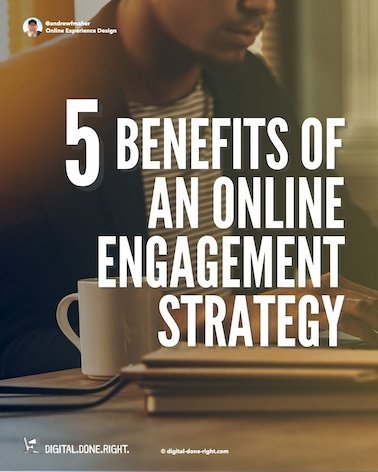The top 10 benefits of having an online engagement strategy
In today's digital age, having a strong online presence is crucial for businesses of any size.
Whether you're a small startup or an established company, the way you present your business online can greatly impact your success. With the vast reach and influence of the internet, it has become essential for even the smallest businesses to have a well-thought-out strategy when it comes to engaging with their audience online.
Gone are the days when simply having a website was enough. Nowadays, customers expect businesses to have a compelling online presence that goes beyond a static webpage. They want to connect with brands on social media, receive personalized email campaigns, and consume valuable content. This is where having an online engagement strategy comes into play. By strategically planning how you interact and communicate with your audience online, you can not only enhance your brand's visibility but also build meaningful relationships with your customers.
An online engagement strategy is a plan for how a business will interact and engage with its audience online. It includes tactics such as social media marketing, email marketing, and content marketing, among others.
the top 10 benefits of having an online engagement strategy
Increased brand awareness: An online engagement strategy can help businesses increase their visibility online and reach a larger audience. For example, a clothing brand can run social media campaigns featuring its latest collection to create buzz and attract new customers.
Better customer relationships: By engaging with customers online, businesses can build stronger relationships and improve customer satisfaction. For instance, a software company can provide responsive customer support through online chat or social media channels, addressing customer queries promptly.
Increased website traffic: An online engagement strategy can drive more traffic to a business's website, which can lead to more conversions and sales. For example, an e-commerce store can optimize their website for search engines and run targeted online advertising campaigns to attract potential customers.
Increased lead generation: By engaging with potential customers online, businesses can generate more leads and convert them into paying customers. For instance, a real estate agency can offer free downloadable guides or conduct webinars to capture potential buyers' contact information and follow up with personalized emails or phone calls.
Greater customer loyalty: By engaging with customers online, businesses can create a sense of loyalty among their customers and retain them for a long period of time. For example, a fitness studio can offer exclusive online workout videos and virtual challenges to keep their customers engaged and committed to their fitness journey.
Better insights into customer needs and preferences: By engaging with customers online, businesses can gather valuable information about their needs and preferences, which can inform future business decisions. For instance, a restaurant can conduct online surveys or host virtual focus groups to understand what types of dishes or dining experiences their customers prefer.
Improved search engine rankings: By creating valuable, shareable content and building a strong online presence, businesses can improve their search engine rankings and increase visibility. For example, a travel agency can regularly publish informative blog posts about popular destinations and travel tips, which can help them rank higher in search results and attract more organic traffic to their website.
Cost-effective marketing: Online engagement strategies are often more cost-effective than traditional marketing methods, making them an attractive option for businesses of all sizes. For example, a startup can leverage social media platforms to promote their products or services at a fraction of the cost of traditional print or TV advertisements.
Easier to track and measure: With online engagement, it is easier to track metrics like website traffic, engagement, conversions, and return on investment, which helps in better decision-making. For example, an online retailer can use analytics tools to monitor the performance of different marketing campaigns and make data-driven adjustments to optimize their results.
Better competitive advantage: By engaging with customers online, businesses can stay ahead of the competition by quickly responding to changing market conditions and customer needs. For example, a technology company can actively participate in online forums or social media discussions to showcase its expertise and establish itself as an industry leader, gaining a competitive edge over its rivals.
Having an online engagement strategy allows businesses to leverage the power of the internet to connect with their target audience, build relationships, drive traffic, and achieve their business goals. By implementing these strategies and adapting them to their specific industry and audience, businesses can maximize the benefits and stay ahead in the digital landscape.
An online engagement strategy is a powerful tool for businesses looking to reach and engage with their audience online. It can help increase brand awareness, improve customer relationships, increase website traffic, and generate leads, among many other benefits. By taking the time to develop and implement an online engagement strategy, businesses can reap the rewards of a strong online presence and increase their chances of success in today's digital world.



